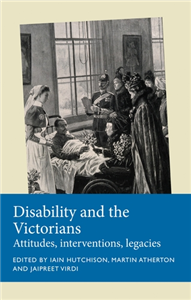Disability and the Victorians
Attitudes, interventions, legacies
by Iain Hutchison, Martin Atherton, Jaipreet Virdi
Description
More Information
Rights Information
Albania, Algeria, Angola, Argentina, Armenia, Australia, Austria, Bahrain, Belgium, Belize, Benin, Bolivia, Bosnia and Herzegovina, Botswana, Brazil, Bulgaria, Burkina Faso, Burundi, Cameroon, Canada, Cape Verde, Central African Republic, Chad, Chile, China, Colombia, Comoros, Congo [DRC], Congo, Republic of the, Costa Rica, Ivory Coast, Croatia, Czech Republic, Denmark, Djibouti, Ecuador, Egypt, El Salvador, Equatorial Guinea, Eritrea, Estonia, Ethiopia, Faroe Islands, Finland, France, French Guiana, Gabon, Gambia, Georgia, Germany, Ghana, Greece, Guatemala, Guinea, Guinea-Bissau, Guyana, Honduras, Hongkong, Hungary, Iceland, India, Indonesia, Iran, Iraq, Ireland, Israel, Italy, Japan, Jordan, Kazakhstan, Kenya, Kuwait, Latvia, Lebanon, Lesotho, Liberia, Libya, Lithuania, Luxembourg, Macau, China, Macedonia [FYROM], Madagascar, Malawi, Malaysia, Mali, Malta, Mauritania, Mauritius, Mayotte, Mexico, Mongolia, Montenegro, Morocco, Mozambique, Namibia, Netherlands, New Zealand, Nicaragua, Niger, Nigeria, Norway, Oman, Pakistan, Panama, Paraguay, Peru, Philippines, Poland, Portugal, Puerto Rico, Qatar, Reunion, Romania, Russia, Rwanda, Saint Helena, Sao Tome and Principe, Saudi Arabia, Senegal, Serbia, Seychelles, Sierra Leone, Singapore, Slovakia, Slovenia, Somalia, South Africa, South Korea, Spain, Sri Lanka, Sudan, Suriname, Swaziland, Sweden, Switzerland, Syria, Taiwan, Tanzania, Thailand, Timor-Leste, Togo, Tokelau, Tunisia, Turkey, Uganda, Ukraine, United Arab Emirates, United Kingdom, United States, Uruguay, Venezuela, Vietnam, Western Sahara, Yemen, Zambia, Zimbabwe, South Sudan, Cyprus, Palestine, Bangladesh, Cambodia, Liechtenstein, Azerbaijan
Endorsements
The prejudices and challenges that people with impairments face in modern society are a direct consequence of the medicalisation of disability that occurred during the reign of Queen Victoria (1837-1901). This collection investigates how and why the legacies of Victorian attitudes and interventions continue into the present century. Taking a wide range of physical, sensory and mental impairments into consideration, the contributors show how Victorian philanthropic interventions in the fields of education, social policy, care provision, employment and employability sought to improve the lives of those who found themselves marginalised and excluded from mainstream society. Whether this exclusion resulted from illness, injury, disease or impairment, clear distinctions were made between those deemed able to be restored to societal norms of ability and behaviour and those who could not. Offering an illustration of how Victorian attitudes and interventions were exported throughout the British Empire and beyond, this collection offers a timely and valuable insight into the shadow cast by our Victorian forebears.
Reviews
The prejudices and challenges that people with impairments face in modern society are a direct consequence of the medicalisation of disability that occurred during the reign of Queen Victoria (1837-1901). This collection investigates how and why the legacies of Victorian attitudes and interventions continue into the present century. Taking a wide range of physical, sensory and mental impairments into consideration, the contributors show how Victorian philanthropic interventions in the fields of education, social policy, care provision, employment and employability sought to improve the lives of those who found themselves marginalised and excluded from mainstream society. Whether this exclusion resulted from illness, injury, disease or impairment, clear distinctions were made between those deemed able to be restored to societal norms of ability and behaviour and those who could not. Offering an illustration of how Victorian attitudes and interventions were exported throughout the British Empire and beyond, this collection offers a timely and valuable insight into the shadow cast by our Victorian forebears.
Author Biography
Martin Atherton is Course Leader and Senior Lecturer in Deaf Studies at the University of Central Lancashire;
Manchester University Press
Manchester University Press is a leading UK publisher known for excellent research in the humanities and social sciences.
View all titlesBibliographic Information
- Publisher Manchester University Press
- Publication Date July 2022
- Orginal LanguageEnglish
- ISBN/Identifier 9781526163929 / 1526163926
- Publication Country or regionUnited Kingdom
- FormatPrint PDF
- Pages216
- ReadershipGeneral/trade; College/higher education; Professional and scholarly
- Publish StatusPublished
- Dimensions216 X 138 mm
- Biblio NotesDerived from Proprietary 5057
- SeriesDisability History
- Reference Code14715
Manchester University Press has chosen to review this offer before it proceeds.
You will receive an email update that will bring you back to complete the process.
You can also check the status in the My Offers area

Please wait while the payment is being prepared.
Do not close this window.



